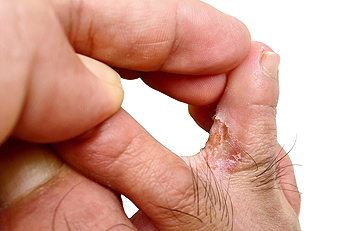Types of Severe Athlete’s Foot

Severe athlete's foot is a fungal infection that can lead to significant discomfort and complications. Common symptoms include intense itching, burning sensations, and peeling skin, particularly between the toes. In severe cases of athlete's foot, blisters may form, causing pain and inflammation. Risk factors include wearing tight, damp shoes, which create an ideal environment for fungal growth, as well as frequent communal areas such as swimming pools and locker rooms. There are different types of severe athlete's foot, including plantar athlete's foot, which affects the soles and can lead to thickened skin and scaling. Vesicular athlete's foot is characterized by the formation of fluid-filled blisters, often causing severe itching. If you have developed athlete’s foot, it is suggested that you contact a chiropodist who can determine which type it is, and offer appropriate treatment methods.
Athlete’s foot can be uncomfortable and unsightly. To learn more about preventing and treating this condition, please consult with one of the chiropodists from The Footcare Centre. Our chiropodists will assess your condition and provide you with quality foot and ankle treatment.
What Is Athlete’s Foot?
Athlete’s foot refers to an infection of the skin on the feet that is caused by a fungus. This fungus is contagious and thrives in warm and moist environments. It is often spread in common areas such as public pools, locker rooms, and showers. It can also spread when sharing personal items, like shoes or towels, with an infected person.
Symptoms
The symptoms of athlete’s foot may include:
Itching, stinging, or burning of the skin on the feet
Cracking or peeling skin, especially between the toes and on the soles of the feet
Scaly, red rash on the foot
Blisters
Foul odor
Treatment
Treatment for athlete’s foot typically involves using over-the-counter topical antifungal medications on the feet. When over-the-counter options are ineffective, you may need to take prescription oral medications or topical antifungal drugs, or a combination of both.
Prevention
Preventing athlete’s foot places an emphasis on good foot hygiene practices.
You can prevent athlete’s foot by:
Washing and drying your feet thoroughly every day
Wearing shoes when walking in public areas
Not sharing personal items, like shoes or socks, with others
Wearing shoes and socks made out of breathable materials
If you have any questions, please feel free to contact our office located in . We offer the newest diagnostic and treatment technologies for all your foot care needs.
